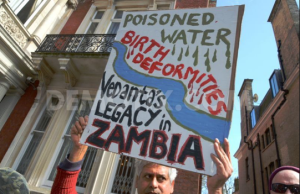 On Friday 6th February 200 people who were victims of a major pollution incident caused by Konkola Copper Mines in 2006, which poisoned the Kafue river and made thousands sick, flooded the Supreme Court of Zambia. They were attending the hearing of an appeal (by KCM) against the precedent judgement in January 2011 which awarded them K10 billion ($2 million) in damages for the sickness caused by drinking polluted water, and defended the original judgement.
On Friday 6th February 200 people who were victims of a major pollution incident caused by Konkola Copper Mines in 2006, which poisoned the Kafue river and made thousands sick, flooded the Supreme Court of Zambia. They were attending the hearing of an appeal (by KCM) against the precedent judgement in January 2011 which awarded them K10 billion ($2 million) in damages for the sickness caused by drinking polluted water, and defended the original judgement.
The 2000 claimants in the original case, led by lead claimant James Nyasulu, had feared they would never get justice until President Michael Sata intervened after meeting them in April 2014 and arranged a hearing of the Supreme Court in Ndola on June 3rd. The hearing took place but one of the three judges, Justice Albert Wood, had previously been an advocate for KCM in earlier hearings of the case. Nyasulu and his group complained to the Supreme Court about this undeclared conflict of interest and were granted a re-sit of the hearing on Friday 6th Feb in Lusaka.
.
However justice was not delivered as Vedanta asked for an adjournment in order to find another lawyer and prepare more documents. The judges granted them 10 days to file any additional information, and the respondents (the victims) to file a response to that. However the judges stated that they were ‘suspicious about Vedanta’s activities’ and asserted that the judgement will be delivered by them at the next sitting of the Supreme Court.
Twenty two of the original 2000 claimants have now died, some from liver and kidney damage potentially caused by the poisoned water, but the rest have awaited justice for eight years.
James Nyasulu says:
.
“After eight long years without justice people are feeling strained and stressed and are losing hope in the judicial system. The court must maintain its integrity and finally fulfill this judgement which was proven in good faith with substantial evidence, and move forwards with fairness.”
.
In the landmark ruling in 2011 High Court judge Phillip Musonda said he wanted to make an example of KCM for their ‘gross recklessness’. He also stated that;
.
“The courts have a duty to protect poor communities from the powerful and politically connected. I agree with the plaintiff’s pleadings that KCM was shielded from criminal prosecution by political connections and financial influence, which put them beyond the pale of criminal justice.”
.
However, Vedanta (KCM) subsequently challenged this decision, claiming they were not responsible for the contamination.